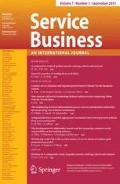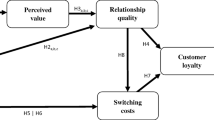Abstract
Service failures can have serious effects on the development of customer–firm relationships, and service recovery processes are implemented to provide a solution to the problem. Prior research has suggested that service recovery efforts lead to different responses from customers. This study offers new insights by investigating the moderating roles of customer loyalty and involvement in the service recovery process. The study focuses on the mobile phone industry and the results reveal that the relationship between perceived effort and customer satisfaction is moderated by these two central relationship characteristics.

Similar content being viewed by others
References
Abdul-Ghani E, Hyde K, Marshall R (2011) Emic and etic interpretations of engagement with a consumer-to-consumer online auction site. J Bus Res 64(10):1060–1066
Ashley C, Noble S, Naveen D, Lemon N (2010) Why customers won’t relate: obstacles to relationship marketing engagement. J Bus Res 64(7):749–756
Balaji M (in press) Investing in customer loyalty: the moderating role of relational characteristics. Serv Bus 6:177–195
Bitner M, Booms B, Tetreault M (1990) The service encounter: diagnosing favourable and unfavourable incidents. J Mark 54:71–84
Blodgett J, Donna H, Stephens T (1997) The effects of distributive, procedural, and interactional justice on postcomplaint behaviour. J Retail 73(2):185–210
Bowden JL (2009) The process of customer engagement: a conceptual framework. J Mark Theory Pract 17(1):63–74
Brodie J, Hollebeek L, Juric B, Ilic A (2011) Consumer engagement: conceptual domain, fundamental propositions, and implications for research. J Serv Res 14(3):252–271
Burnham T, Frels J, Mahajan V (2003) Consumer switching costs: a typology, antecedents and consequences. J Acad Mark Sci 31(2):109–126
Butcher K, Sparks B, O'Callaghan F (2001) Evaluative and relational influences on service loyalty. Int J Serv Ind Manag 12(4):310–327
Cambra J, Berbel J, Ruiz R, Vázquez R (2011) Managing service recovery processes: the role of customers’ age. J Bus Econ Manag 12(3):503–528
Cambra J, Melero I, Sese J (2014) From dissatisfied customers to evangelist of the firms: a study of the Spanish mobile service sector. Bus Res Q 17(1):1–12
Carmines E, Zeller R (1979) Reliability and validity assessment. In: Sage University Paper series on quantitative applications in the social sciences (07-017). Sage, Beverly Hills, CA
Cassel C, Hackl P, Westlund A (1999) Robustness of partial least-squares method for estimating latent variable quality structures. J Appl Stat 26(4):435–446
Chang Y, Chang YH (2010) Does service recovery affect satisfaction and customer loyalty? An empirical study of airline services. J Air Transp Manag 16:340–342
Chen P, Hitt L (2002) Measuring switching costs and their determinants in Internet enabled businesses: a study of the online brokerage industry. Inf Syst Res 13(5):255–274
Chin W (1998) Issues and opinion on structural equation modelling. MIS Q 22(1):7–15
Chung H (2009) Structure of marketing decision making and international marketing standardization strategies. Eur J Mark 43(5–6):794–811
Cunliffe M, Johnston R (2008) Complaint management and the role of the chief executive. Serv Bus 2(1):47–63
De Matos A, Henrique L, Vargas A (2007) Service recovery paradox: a meta-analysis. J Serv Res 10(3):60–77
DeWitt T, Nguyen D, Marshall R (2008) Exploring customer loyalty following service recovery. J Serv Res 10(3):269–281
Dick A, Basu K (1994) Customer loyalty: toward an integrated conceptual framework. J Acad Mark Sci 22(2):99–113
Druckenmiller G (2009) Customer engagement: using technology to build relationships. Mintz & Hoke Communications Group, www.mintz-hoke.com
Estelami H (2003) Sources, characteristics, and dynamics of postpurchase price complaints. J Bus Res 56(5):411–419
Fornell C, Larcker D (1981) Evaluating structural equation models with unobservable variables and measurement error. J Mark Res 18(1):39–50
Gelbrich K (2010) Anger, frustration, and helplessness after service failure: coping strategies and effective informational support. J Acad Mark Sci 38(5):567–585
Gelbrich K, Roschk H (2011) A meta-analysis of organizational complaint handling and customer responses. J Serv Res 14(1):24–43
Gupta S, Lehmann D, Stuart J (2004) Valuing customers. J Mark Res 41:7–18
Ha J, Jang S (2009) Perceived justice in service recovery and behavioural intentions: the role of relationship quality. Int J Hosp Manag 28(3):319–327
Hair J, Sarstedt M, Ringle C, Mena J (2012) An assessment of the use of partial least squares structural equation modeling in market research. J Acad Mark Sci 40(3):414–433
Harker J, Egan J (2006) The past, present and future of relationship marketing. J Mark Manag 22(1):215–242
Hennig-Thurau K, Gwinner P, Gremler D (2002) Understanding relationship marketing outcomes: an integration of relational benefits and relationship quality. J Serv Res 4(3):230–247
Higgins E, Scholer A (2009) Engaging the consumer: the science and art of the value creation process. J Consum Psychol 19(2):100–114
Hocutt M, Stone T (1998) The impact of employee empowerment on the quality of a service recovery effort. J Qual Manag 3(1):117–132
Homburg C, Fürst A (2005) How organizational complaint handling drives customer loyalty: an analysis of the mechanistic and the organic approach. J Mark 69(3):95–114
Huang W (2008) The impact of other-customer failure on service satisfaction. Int J Serv Ind Manag 19(4):521–536
Jayawardhena C, Kuckertz A, Karjaluoto H, Kautonen T (2009) Antecedents to permission based mobile marketing: an initial examination. Eur J Mark 43(3–4):473–499
Johnston R, Michel S (2008) Three outcomes of service recovery. Int J Oper Prod Manag 28(1):79–99
Joireman J, Gregoire Y, Devezer B, Tripp T (2013) When do customers offer a second chance following a double deviation? The impact of inferred firm motives on customer revenge and reconciliation. J Retail 89(3):315–337
Jones M, Reynolds K, Mothersbaugh D, Beatty S (2007) The positive and negative effects of switching costs on relational outcomes. J Serv Res 9(4):335–355
Karatepe O (2006) Customer complaints and organizational responses: the effects of complaints’ perceptions of justice on satisfaction and loyalty. Int J Hosp Manag 25(1):69–90
Kau A-K, Loh E (2006) The effects of service recovery on consumer satisfaction: a comparison between complainants and non-complainants. J Serv Mark 20(2):101–111
Keil M, Tan B, Wei K, Saarinen T, Tuunainen V, Wassenaar A (2000) A cross-cultural study on escalation of commitment behaviour in software projects. MIS Q 24(2):299–325
Kim S, Oh J (2012) Employee emotional response toward healthcare organization’s service recovery efforts and its influences on service recovery performance. Serv Bus 6(3):297–321
Kumar V, Aksoy L, Donkers B, Venkatesan R, Wiesel T, Tillmanns S (2010) Undervalued or overvalued customers: capturing total customer engagement value. J Serv Res 13(3):297–310
Kumar P, Dass M, Topaloglu O (2011) Exploring satisfaction in business-to-business services: a path-analytic approach. Serv Bus 5(1):13–27
Kumar V, Pozza I, Ganesh J (2013) Revisiting the satisfaction-loyalty relationship: empirical generalizations and directions for future research. J Retail 89(3):246–262
Lindgreen A, Palmer R, Wetzels M, Antioco M (2009) Do different marketing practices require different leadership styles? J Bus Ind Mark 24(1):14–26
Mathwick C, Malhotra N, Rigdon E (2001) Experiential value: conceptualization, measurement, and application in the catalogue and internet shopping environment. J Retail 77(1):39–54
Mattila A, Patterson P (2004) The impact of culture on consumers’ perceptions of service recovery efforts. J Retail 80(3):196–206
Maxham J (2001) Service recovery’s influence on consumer satisfaction, positive word-of-mouth, and purchase intentions. J Bus Res 54(1):11–24
Maxham J, Netemeyer R (2002) Modelling customer perceptions of complaints handling over time: the effect of perceived justice on satisfaction and intent. J Retail 78(4):239–252
McColl-Kennedy J, Sparks B (2003) Application of fairness theory to service failures and service recovery. J Serv Res 5(3):251–266
Michel S, Meuter M (2008) The service recovery paradox: true but overrated? Int J Serv Ind Manag 19(4):441–457
Miller J, Craighead C, Karwan K (2000) Service recovery: a framework and empirical investigation. J Oper Manag 18(4):387–400
Miranda-Gumucio L, Gil-Pechuán I, Palacios-Marqués M (2013) An exploratory study of the determinants of switching and loyalty in prepaid cell phone users: an application of concept mapping. Serv Bus 7(4):603–622
Morgan R, Hunt S (1994) The commitment-trust theory of marketing relationships. J Mark 58:20–38
Morrison O, Huppertz J (2010) External equity, loyalty program membership, and service recovery. J Serv Mark 24(3):244–254
Nikbin D, Ismail I, Marimuthu M (2013) The relationship between informational justice, recovery satisfaction and loyalty: the moderating role of failure attributions. Serv Bus 7(3):419–435
Oliver R (1999) Whence consumer loyalty? J Mark 63 (Special Issue):33–44
Orsingher C, Valentini S, De Angelis M (2010) A meta-analysis of satisfaction with complaint handling in services. J Acad Mark Sci 38(2):169–186
Palmatier R, Rajiv PD, Dhruv G, Kenneth R (2006) Factors influencing the effectiveness of relationship marketing: a meta-analysis. J Mark 70:136–153
Palmatier R, Jarvis C, Bechkoff J, Kardes F (2009) The role of customer gratitude in relationship marketing. J Mark 73:1–18
Petersen J, Mcalister A, Reibstein D, Winer R, Kumar V, Atkinson G (2009) Choosing the right metrics to maximize profitability and shareholder value? J Retail 85(1):95–111
Polo Y, Sese FJ (2009) How to make switching costly: the role of marketing and relationship characteristics. J Serv Res 12(2):119–137
Schoefer K, Diamantopoulos A (2008) Measuring experienced emotions during service recovery encounters: construction and assessment of the ESRE scale. Serv Bus 2(1):65–81
Smith A, Bolton R, Wagner J (1999) A model of customer satisfaction with service encounters involving failure and recovery. J Mark Res 36:356–372
Sparks B, McColl-Kennedy J (2001) Justice strategy options for increased customer satisfaction in a services recovery setting. J Bus Res 54(3):209–218
Tax S, Brown S, Chandrashekaran M (1998) Customer evaluations of service complaint experiences: implications for relationship marketing. J Mark 62:60–76
van Doorn J, Lemon K, Mittal V, Nass S, Pick D, Pirner P, Verhoef P (2010) Customer engagement behaviour: theoretical foundations and research directions. J Serv Res 13(3):253–266
Verhoef P, Reinartz W, Krafft M (2010) Customer engagement as a new perspective in customer management. J Serv Res 13(3):247–252
Vivek S (2009) A scale of consumer engagement. Doctor of Philosophy Dissertation, Department of Management and Marketing, Graduate School–The University of Alabama, UMI. Microform 3369775
Voorhees C, Brady M (2005) A service perspective on the drivers of complaint intentions. J Serv Res 8(2):192–204
Zeithaml V, Berry L, Parasuranam A (1996) The behavioural model of service failure and recovery strategies. J Mark 60:31–46
Acknowledgments
Financial support from the Ministry of Science and Technology of Spain (ECO2011-23027) and from Generés (S09) and Fondo Social Europeo are gratefully acknowledged. The authors appreciate the financial support received from the projects ECO2011-23027 and PRI-AIBDE-2011-1329 (MICINN, FEDER), and S09-PM062 (Spanish Regional Government of Aragón), as well as for their recognition as members of the research group GENERES (http://generes.unizar.es/en/).
Author information
Authors and Affiliations
Corresponding author
Appendices
Appendix 1
Appendix 2
Rights and permissions
About this article
Cite this article
Cambra-Fierro, J., Melero-Polo, I. & Sese, J. Does the nature of the relationship really matter? An analysis of the roles of loyalty and involvement in service recovery processes. Serv Bus 9, 297–320 (2015). https://doi.org/10.1007/s11628-013-0228-4
Received:
Accepted:
Published:
Issue Date:
DOI: https://doi.org/10.1007/s11628-013-0228-4




